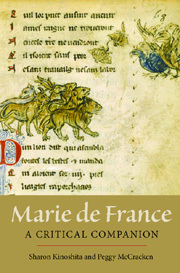Book contents
- Frontmatter
- Contents
- Preface
- Note on Editions
- 1 Introduction: the World of Marie de France
- 2 Communication, Transmission, and Interpretation: Literary History
- 3 Courtly Love and Feudal Society: Historical Context
- 4 Movement and Mobility: Plot
- 5 Bodies and Embodiment: Characters
- 6 Repetition and the Art of Variation: Narrative Techniques
- 7 Posterity: The Afterlives of Marie's Works
- Further Reading
- Index
- Already Published
6 - Repetition and the Art of Variation: Narrative Techniques
Published online by Cambridge University Press: 12 September 2012
- Frontmatter
- Contents
- Preface
- Note on Editions
- 1 Introduction: the World of Marie de France
- 2 Communication, Transmission, and Interpretation: Literary History
- 3 Courtly Love and Feudal Society: Historical Context
- 4 Movement and Mobility: Plot
- 5 Bodies and Embodiment: Characters
- 6 Repetition and the Art of Variation: Narrative Techniques
- 7 Posterity: The Afterlives of Marie's Works
- Further Reading
- Index
- Already Published
Summary
As has been evident throughout this book, the project of interpreting medieval texts often throws into question many of the basic assumptions modern readers bring to the study of literature. Questions of authorship, as we saw in Chapter 1, run up against issues such as the uncertain or hypothetical attribution of many works and our authors' absence from the historical record; meanwhile, questions of what constitutes a medieval work are complicated by textual variation across manuscripts and recensions. In this chapter we turn to repetition and variation, not as accidents of history and textual transmission but as a fundamental aspect of medieval aesthetics. In the Middle Ages, as Peter Haidu long ago pointed out, repetition is not simply “tolerated” but is “positively valued,” while conventionality is an essential and distinguishing characteristic of medieval literary practice – “a formal embodiment of the shared consciousness between writers and audience.” This chapter revisits Marie's corpus while attempting to put aside the expectation and, especially, the privileging of singularity of all kinds: the distinctiveness of authorial voice, characters, and plots. As we have seen, the manuscript evidence makes clear that in the Middle Ages, the lais we now attribute to Marie de France were not always associated with her name. From the standpoint of their transmission and reception, the boundaries between her lais and the texts we today call “anonymous Breton lais” were much more fluid.
- Type
- Chapter
- Information
- Marie de FranceA Critical Companion, pp. 173 - 200Publisher: Boydell & BrewerPrint publication year: 2012



